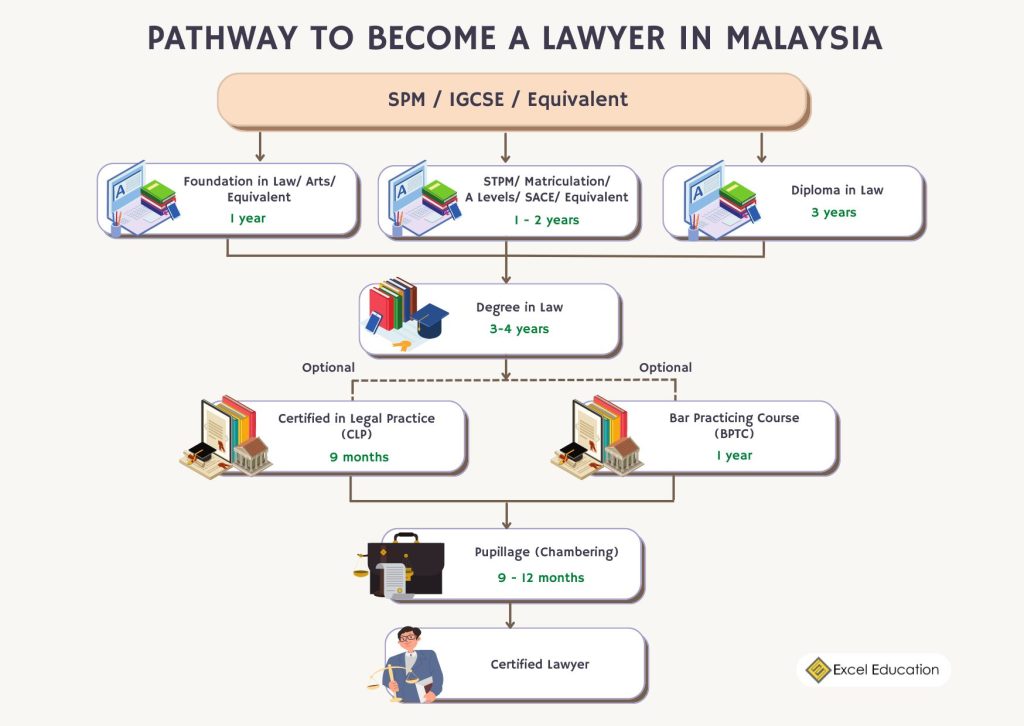
In this article, we will provide you with everything you need to know about how to be a Lawyer in Malaysia including the entry requirements, pathway and which university you can consider to study
What is a Lawyer?

Ah, Lawyers! They resemble superheroes, except rather than wearing capes, they dress in suits (and occasionally gowns!). What precisely do they do then? Lawyers are experts in the legal field who advise and represent clients in a range of legal situations. They assist people and organisations in navigating the complexity of the law and making sure that their rights are upheld. It can be helpful to keep in mind that, although all attorneys are Lawyers, not all Lawyers are attorneys. The key difference between the two is that attorneys are permitted to represent clients in legal proceedings, including court appearances and other similar proceedings, while Lawyers do not have this same level of authorisation.
You may have heard the term “Barrister” used in the same sentence as “Lawyer.” Although they are somewhat similar, the two words are not entirely the same. In common Law jurisdictions, a Barrister is a specific type of Lawyer. The primary focus of Barristers is on courtroom advocacy and litigation, with a significant emphasis on specialisation in these areas. The tasks of legal professionals typically involve representing clients in superior courts and tribunals, preparing legal documents, conducting legal research, and providing authoritative legal advice.
Below we will explain the details of the general pathway on How to become a Lawyer in Malaysia together with the requirements needed.
Types of Lawyer

Types of Lawyer | Description |
Bankruptcy Lawyer | Bankruptcy Lawyers are legal professionals who specialise in managing financial insolvency matters for both individuals and businesses. Bankruptcy Lawyers have a specialisation in either consumer bankruptcy or commercial bankruptcy. |
Corporate Lawyer | Corporate Lawyers, commonly referred to as Business Lawyers, are responsible for managing legal affairs on behalf of companies. Their primary objective is to ensure that all business transactions comply with local, state, and federal laws. |
Constitutional Lawyer | The field of Constitutional Law involves the analysis and application of the United States Constitution, with a focus on reconciling the needs of government entities with those of individual citizens. This is the primary responsibility of constitutional Lawyers. |
Criminal Defence Lawyer | The role of Criminal Defence Lawyers is to represent individuals who have been accused of criminal activity and to ensure that their fundamental rights and freedoms are protected in accordance with the justice system. |
Employment and Labour Lawyer | The field of Employment and Labour Law pertains to the interactions and connections among employers, employees, and unions. |
Entertainment Lawyer | Lawyers specialising in Entertainment Law provide legal representation to clients in the media industry, including athletes, artists, musicians, actors, and brands. |
Estate Planning Lawyer | A Lawyer who specialises in estate planning possesses extensive knowledge of property rights, wills, probate, and trusts. |
Family Lawyer | Family Lawyer encompasses a wide range of legal matters beyond divorce, such as child custody, alimony, and the division of marital assets. |
Immigration Lawyer | The role of Immigration Lawyers is crucial in assisting individuals and families in meeting the necessary requirements for living, working, or studying abroad. |
Tax Lawyer | Professionals who specialise in Tax Law possess a comprehensive understanding of the intricate details and nuances of tax laws and regulations and can be employed in diverse work environments. |
Skills to be a Lawyer

- Communication
Everyone will be aware of what is expected of them and the steps they need to take if there is effective communication. The value of trust in the lawyer-client relationship cannot be overlooked. By properly communicating with your clients, you may increase their confidence in your legal expertise.
- Analytical Thinking
For lawyers, having strong analytical abilities is a must. We may become more effective communicators, thinkers, creators, and lawyers in general by honing these abilities since they are transferable skills that can be helpful in practically any setting. We are able to tackle issues more quickly and effectively thanks to them.
- Attention to Detail
The success of your legal career depends on your accuracy, which is a crucial legal competence. A single misplaced word can alter the meaning of a clause or contract, and clients may stop doing business with your company as a result of receiving emails, letters, or papers that are misspelt or poorly written.
- Research
Lawyers must be skilled in conducting legal research to identify relevant laws and precedents that can be applied to a case. Good legal research covers more than fifty percent of the issue and gives you the confidence to confidently submit the entire issue to the authority without hesitation. It aids you in successfully resolving the matter without complications.
- Problem-Solving
To outmanoeuvre opposing parties and secure a favourable outcome for your client, you will need to employ your creative thinking and problem-solving skills almost every day. Lawyers must be able to think creatively and develop innovative solutions to complex legal issues, often under time pressure.
Are you eligible to study Law?
Academic Entry | Minimum Score |
Foundation | CGPA 2.00 |
Diploma | CGPA 2.67 |
STPM | CGPA 2.67 |
UEC | 5Bs |
A-Levels | 2Ds |
Australian Matriculation (ATAR) | 70 |
IB Diploma | 24 |
Note: Universities may have different requirements. To learn more, get in touch with us!
Entry Level | Minimum Score |
IELTS | Band 6.0 |
MUET | Band 4 |
TOEFL | 60 |
Note: Universities may have different English Language requirements. To learn more, get in touch with us!
General Pathway on How to become a Lawyer in Malaysia

1. Complete a recognised Pre-University or equivalent programme
After completing your SPM or anything equivalent, you can either choose to further your study in:
- Any Foundation which will take you only 1 year to complete
- STPM/Matriculation/A-Levels/SACE/Equivalent or
- Diploma in Law which will take you 3 years to complete before you pursue your Degree in Law
2. Law graduate from an accredited university
Upon successful completion of a pre-university course, you can move on to pursue a Law Degree. There are two types of Law Degrees available, which are:
- A 3-year programme and
- A 4-year programme that includes a professional year
By pursuing a 3-year Law Degree, you will acquire the necessary knowledge and skills to qualify as a Lawyer. The programme includes important legal topics such as the Law of Contract, the Law of Torts, Constitutional Law, and Criminal Law. To pursue this degree, you have the option to attend private institutions in Malaysia or universities abroad. However, it is important to select a recognised programme to prevent any legal practise limitations in Malaysia.
On the other hand, a 4-year Law Degree not only imparts the necessary skills and knowledge but also offers professional experience. Throughout this programme, you will be covered with several topics such as the Law of Evidence, Criminal Procedure, Civil Procedure, and Professional Practice. Typically, only Malaysian public universities provide this Degree programme. Thus, it’s essential to select a recognised programme by LPQB to ensure that you’re eligible to practise Law in Malaysia in the future.
3. Earn a Certificate in Legal Practice (CLP) or Bar Professional Training Course (BPTC)
Individuals who have earned a law degree must meet the requirements of either the Certificate in Legal Practice (CLP), a Malaysian qualification, or the Bar Professional Training Course (BPTC), a qualification based in the United Kingdom, in order to begin their legal profession as a Pupil-in-Chambers, as stated in Section 3 of the Legal Profession Act 1976.
To practise as a Lawyer in Malaysia after completing your degree in law, passing a professional law exam is required. To become a qualified Lawyer, individuals can choose between two options: completing the Certificate of Legal Practice (CLP) or the Bar Practising Course.
The Legal Profession Qualifying Board of Malaysia (LPQB) conducts the CLP, which is a professional Law exam and 9-month course. There are multiple private colleges in Malaysia that provide this course. The CLP exam is comprised of five papers: General Paper, Civil Procedure, Criminal Procedure, Evidence, and Professional Practice. To successfully complete the programme, it is required to pass all 5 subjects in the Main Examination, which typically takes place in July. In case of failing one subject, you will be granted a conditional pass and given the opportunity to retake the exam up to two times during the Supplementary Examination. Retaking all 5 subjects is required if a student fails two or more papers. The CLP allows a maximum of four attempts, which includes the first Main Examination and three resits. In case you do not pass any of the four attempts, you will be required to register again for the CLP and pay the complete fees.
In the UK, you have the option to pursue the Bar Professional Training Course, previously known as the Bar Professional Training Course (BPTC). Law graduates can choose between two options to further their legal education: the Bar Professional Training Course (BPTC) in the UK or the Certificate in Legal Practise (CLP) offered by the Legal Profession Qualifying Board (LPQB) in Malaysia.
4. Undergo Pupillage (known as “Chambering”)
Pupillage, also known as chambering, is a period of industrial experience or internship that Law graduates need to complete in order to be called to the Malaysian bar. Upon completing the CLP or BPTC, you will be required to undertake pupillage. Graduates who are exempt from the CLP can start their pupillage immediately after their Degree.
During your 9-month pupillage, you will work under the guidance of a senior counsel or master who has at least 7 years of experience, in order to gain an understanding of the tasks of an advocate and solicitor. You may be involved in activities such as conducting research to assist your senior counsel in preparing for a case, drafting pleadings, preparing written statements (affidavits), interviewing clients, and observing senior advocates during court trials.
Pupils are also required to complete an Ethics and Professional Standards course and spend 14 days providing free legal advice to the public on topics such as Women’s Rights, Criminal Matters, Syariah Law, or Migrant Rights.
Upon completion of your pupillage, you will be called to the bar and admitted and enrolled as an advocate and solicitor, marking the end of your journey to becoming a qualified Lawyer.
Additional note: The duration of pupillage in East Malaysia is different from Peninsular Malaysia. If you want to be admitted as an advocate and solicitor of the High Court of Malaya in Peninsular Malaysia, you need to undergo pupillage for 9 months. But in East Malaysia, you have to undergo pupillage for 12 months to be admitted to the High Court of Sabah and Sarawak.
Top 5 Law School in Malaysia
1. Taylor's University

Taylor’s University is a private university located in Subang Jaya, Selangor, Malaysia. It was established in 1969 as a college before being upgraded to university status in 2010. The university offers a wide range of programmes at the Foundation, Diploma, bachelor’s Degree, and postgraduate levels in fields such as Business, Law, Engineering, Medicine, Hospitality, and more.
Taylor’s University’s Bachelor of Laws (Honours) programme is recognized by the Legal Profession Qualifying Board, Malaysia. The Law Degree provides an in-depth understanding of legal doctrines and concepts in various areas of law. Students will learn about many key areas of law, including contract law, criminal law, constitutional law, property law, and more. By integrating theoretical studies with practical experience, students develop the skills to apply these principles effectively in various factual scenarios.
Programme Offered | Bachelor of Laws (Honours) |
Duration | 3 Years |
Intake | February, April, September |
Indicative Fees (2024) | Local students: RM 122,954 International students: USD 31,783 |
2. University of Reading Malaysia

University of Reading is a branch campus of the University of Reading, located in Johor, Malaysia. It was established in 2019, and offers undergraduate and postgraduate programmes in various disciplines, including business, accounting, finance, psychology, and law.
The University of Reading is known for producing law graduates who are well-rounded and highly adaptable. The Law Degree is recognized by the Legal Professional Qualifying Board (LPQB) and provides good balance of academic learning and practical experience. Students will be exposed to problem-solving approach in which they will be presented with real-life cases to examine and discuss. This helps students develop important skills like presentation, arguing, negotiation, and resolving disputes. There is also an opportunity for students to spend one or even two years at the Reading UK campus.
Programme Offered | Bachelor of Laws (LL.B) |
Duration | 3 – 3.5 years |
Intake | April, July, September |
Indicative Fees (2024) | Local students: RM 112, 800 International students: 135, 600 |
3. Brickfields Asia College (BAC)

Brickfields Asia College (BAC) is a private tertiary education institution located in Malaysia. Established in 1991, BAC is known for its law programmes, particularly the United Kingdom (UK) law programmes offered in partnership with the University of London and the University of Northumbria.
Brickfields is one of the institutions affiliated with The University of London (UOL) for the LLB undergraduate degree. The programme offered by BAC is recognised by the Legal Profession Qualifying Board of Malaysia (LPQB) for entry into the Certificate in Legal Practice (CLP) examinations and by the Bar Professional Training Course (BPTC) in the UK. BAC also offers several other undergraduate Law programmes in partnership with various overseas universities.
Programme Offered | LLB (Hons), University of London, Brickfields Asia College |
Duration | 3 Years |
Intake | January, April, June, September |
Indicative Fees (2024) | Local students: RM 77,000 International students: RM 92,000 |
4. Multimedia University (MMU)

Multimedia University (MMU) is a private university in Malaysia with campuses located in Cyberjaya and Melaka. It was established in 1996 and is known for its expertise in ICT (Information and Communications Technology) and creative multimedia.
The Bachelor of Law (Hons.) at MMU is one of the Law programmes which is exempted from the CLP examination. Studying Law at MMU grants you with multiple opportunities including programmes with disciplines such as Cyber Law, IT Law, and Multimedia Law, a three-month legal attachment programme, highly experienced Law lecturers, and participation in mooting competitions.
Programme Offered | Bachelor of Law (Hons.) |
Duration | 4 Years |
Intake | March, July, October |
Indicative Fees (2024) | Local students: RM75,000 |
5. HELP University

HELP University is a higher education learning institution dedicated to making a meaningful impact towards their students and graduates through education. Having two campus locations in Malaysia, HELP has steadily shown growth and development into an institution centering on sound academic standards and continuous improvements as well as broad collaborative partnerships with other learning institutions and professional industries.
The Faculty of Law and Government of HELP University strives to produce law graduates with knowledge, attributes, skills, and competencies necessary in professional legal industries. The Faculty offers a comprehensive curriculum imbued with student and faculty-led publications on Law advancements, professional development courses, guest lectures, visits to courts and the Parliament, as well as opportunities for transfer with partner universities in the UK.
Programme Offered | Duration | Intake | Indicative Fees (2024) |
Bachelor of Laws (Hons) | 3 Years | January, May, August | Local Students: RM 68,900 International Students: RM 68,900 |
UK Degree Transfer Programme (Law) | 2 Years | December, July, September | Local Students: RM 60,000 International Students: RM 60,000 |
Recommended Articles to Read
About The Author

Qasyrina Zahirah
Still figuring out the direction of my life and most of the time life directs me to good foods and beaches 🙂

